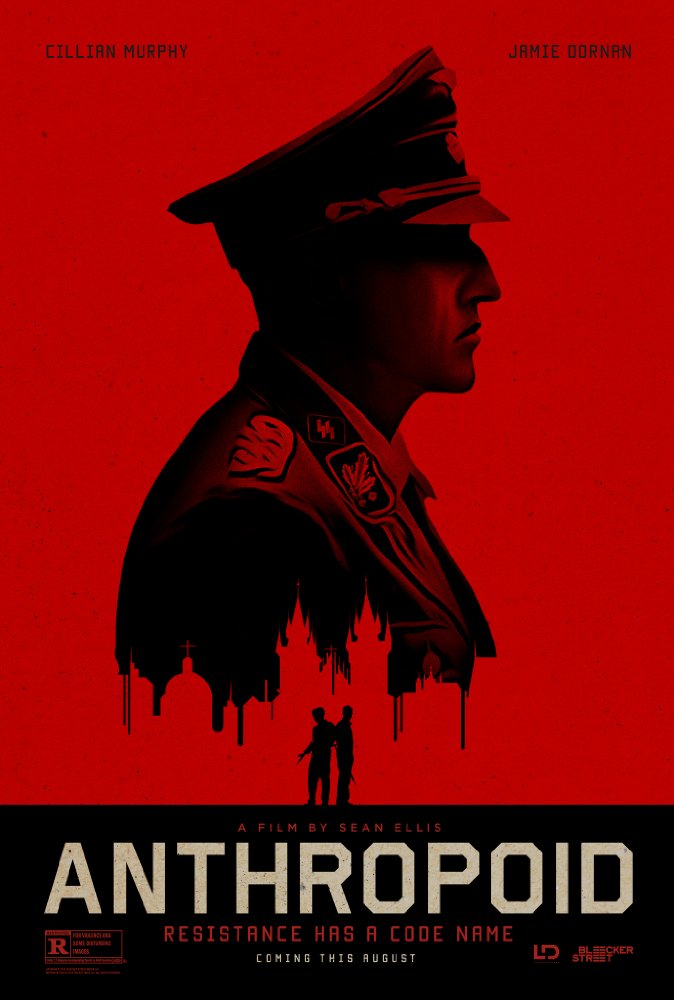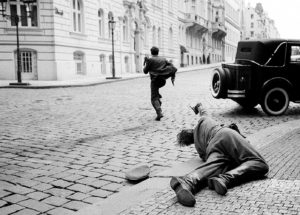A Movie Review
of Anthropoid (2017)
By Lance Zedric
 “What the hell is an Anthropoid?” I asked myself when considering whether to review a movie by the same name. My science teachers never taught me about such a thing, or if they did, I wasn’t paying attention. Fortunately, the film’s promotional posters featured the profile of an SS officer on a blood-red background. That, I could understand.
“What the hell is an Anthropoid?” I asked myself when considering whether to review a movie by the same name. My science teachers never taught me about such a thing, or if they did, I wasn’t paying attention. Fortunately, the film’s promotional posters featured the profile of an SS officer on a blood-red background. That, I could understand.
Reinhard Heydrich, the chief architect of the Final Solution (systematic genocide of all Jews in Europe), and number three goon in Hitler’s Third Reich, was one of the all-time bad Nazis and needed a good killing. Known by the loving sobriquet, The Butcher of Prague, for his brutal occupation of Czechoslovakia, that’s just what he got—courtesy of the brave men of Operation Anthropoid.
In late 1941, two British-trained Czech agents (played by Cillian Murphy and Jamie Dornan), parachuted into occupied Czechoslovakia and established contact with the Czech underground with orders from their government-in-exile in London, to assassinate Heydrich (Detlef Bothe). Since the Gestapo (German Secret Police) had already decimated the resistance, its leader balked because he knew the Germans would open a huge can of reprisal if anyone knocked off their golden boy, who commanded all German forces in the country and held the absurd title of “Protector of Bohemia and Moravia,” which was effectively a euphemism for “Occupier of what used to be called Czechoslovakia before Germans conquered it.”
Murphy and Dornan enlist the help of two women (convenient love interests) who assist them in planning the attack in downtown Prague, the capital city. Like in many/most war films, the fictitious romantic sub-plot in “Anthropoid” drives the story and broadens the commercial appeal, but does not weigh it down. Although the assassination is ultimately successful (Heydrich dies on June 4, 1942, a week after the somewhat botched attempt), the Germans lock down the city and, with the help of a Czech traitor, trap the assassins hiding in a church awaiting evacuation to England.
 Unfortunately, it didn’t end well for anyone in either the historical or Hollywood version of the event. In retaliation for the assassination, the Germans killed over 5,000 civilians and further tightened the screws during their occupation. Had Heydrich not been killed, perhaps he would have killed millions more innocent people throughout Europe and elsewhere, but that will never be known.
Unfortunately, it didn’t end well for anyone in either the historical or Hollywood version of the event. In retaliation for the assassination, the Germans killed over 5,000 civilians and further tightened the screws during their occupation. Had Heydrich not been killed, perhaps he would have killed millions more innocent people throughout Europe and elsewhere, but that will never be known.
Critically, “Anthropoid” was an ambitious cinematic attempt that hit the mark (pun)—and didn’t. The first half of the movie was slow (but interesting), and most World War II/espionage genre-philes (my word) could draw something from its well given they didn’t dip too deep. The recreation of war-time Prague was aesthetically pleasing, as was the portrayal of an event from a foreign perspective. Although the acting was solid throughout, the dialogue was pedestrian—i.e., the mostly British and Irish actors sometimes “walked all over” their on-again, off-again Czech accents with too heavy a “Queen’s brogue” if you will.
Despite the occasional artistic blip and an anti-climactic ending, “Anthropoid” reawakened interest in an event that had been in a (forgive the metaphor) flaccid, 75-year resolution phase. Also, the film might have generated more “buzz” with a less “insectile-sounding” title and more work in the editing room.
In true-life, SS-Obergruppenfuhrer Reinhard Heydrich, was one of the most evil, ruthless, and ambitious figures of World War II, but Operation Anthropoid brought him down. The story–even presented in mediocre form–needed to be told–as a cautionary tale warning despots and dreamers alike, that people like Heydrich are ultimately destroyed. By definition, an “anthropoid” is “human-like” in form, but in the case of Heydrich, even that’s a stretch. 7 out of 10 stars.
To read past reviews, go to my website at www.Lancebooks.com and click “Movie Reviews”
